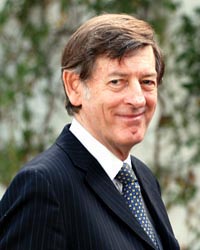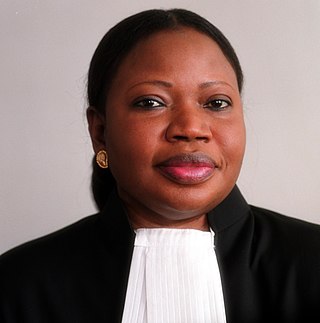The federal judiciary of the United States is one of the three branches of the federal government of the United States organized under the United States Constitution and laws of the federal government. The U.S. federal judiciary consists primarily of the U.S. Supreme Court, the U.S. Courts of Appeals, and the U.S. District Courts. It also includes a variety of other lesser federal tribunals.
Khalida Rashid Khan is a Pakistani judge who became the first female judge in the Superior Judiciary of Pakistan. She also served as the president of the International Criminal Tribunal for Rwanda.

Derek Schofield, is a British lawyer and the former Chief Justice of Gibraltar. He commenced his legal career in 1961 when he was appointed assistant in the office of the clerk of the court in Lancashire. He was called to the bar in 1970, at Gray's Inn in London.

There are various levels of judiciary in England and Wales—different types of courts have different styles of judges. They also form a strict hierarchy of importance, in line with the order of the courts in which they sit, so that judges of the Court of Appeal of England and Wales are generally given more weight than district judges sitting in county courts and magistrates' courts. On 1 April 2020 there were 3,174 judges in post in England and Wales. Some judges with United Kingdom-wide jurisdiction also sit in England and Wales, particularly Justices of the United Kingdom Supreme Court and members of the tribunals judiciary.

A supreme court is the highest court within the hierarchy of courts in most legal jurisdictions. Other descriptions for such courts include court of last resort, apex court, and highcourt of appeal. Broadly speaking, the decisions of a supreme court are not subject to further review by any other court. Supreme courts typically function primarily as appellate courts, hearing appeals from decisions of lower trial courts, or from intermediate-level appellate courts.

The judiciary of Pakistan is a hierarchical system with two classes of courts: the superior judiciary and the subordinate judiciary. The superior judiciary is composed of the Supreme Court of Pakistan, the Federal Shariat Court and five High Courts, with the Supreme Court at the apex. There is a High Court for each of the four provinces as well as a High Court for the Islamabad Capital Territory. The Constitution of Pakistan entrusts the superior judiciary with the obligation to preserve, protect and defend the constitution. Neither the Supreme Court nor a High Court may exercise jurisdiction in relation to Tribal Areas, except otherwise provided for. The disputed regions of Azad Kashmir and Gilgit–Baltistan have separate court systems.

Hassan Bubacar Jallow is a Gambian judge who has served as Chief Justice of the Gambia since February 2017. He was the Prosecutor of the International Criminal Tribunal for Rwanda (ICTR) from 2003 to 2016, and Prosecutor of the Mechanism for International Criminal Tribunals (MICT) from 2012 to 2016, both at the rank of United Nations Under Secretary-General. He served as Minister of Justice and Attorney General from 1984 to 1994 under President Dawda Jawara.

The Judiciary of Spain consists of Courts and Tribunals, composed of judges and magistrates (Justices), who have the power to administer justice in the name of the King of Spain.

Fatou Bom Bensouda is a Gambian lawyer and former Prosecutor of the International Criminal Court (ICC), who has served as the Gambian High Commissioner to the United Kingdom since 3 August 2022.
Mabel Maame Agyemang is the current Chief Justice of the Turks and Caicos Islands. An expert superior court judge with a judicial career spanning decades, Justice Agyemang served in the judiciaries of the governments of Ghana, The Gambia and Eswatini prior to her current role in the Turks and Caicos Islands. She was also the first female Chief Justice of The Gambia.
The United Nations Appeals Tribunal (UNAT), which replaces the former United Nations Administrative Tribunal, is an appellate court, of the two-tier formal system of administration of justice in the UN. It was established by the UN General Assembly in December 2008 to review appeals against judgments rendered by the United Nations Dispute Tribunal (UNDT). UNAT, including its registry, is based in New York, and holds sessions in New York City, Geneva and Nairobi, as required by caseload. It held its first session in Geneva in 2010. The UNAT is a component of the UN's Internal Justice System, and is listed as an office, along with UNDT and the Office of the United Nations Ombudsman, under the UN secretariat. The UNAT like the UNDT, is dependent for its administrative, office, staffing, and travel needs including that of the judges, on the UN secretariat.

The judiciary of Scotland are the judicial office holders who sit in the courts of Scotland and make decisions in both civil and criminal cases. Judges make sure that cases and verdicts are within the parameters set by Scots law, and they must hand down appropriate judgments and sentences. Judicial independence is guaranteed in law, with a legal duty on Scottish Ministers, the Lord Advocate and the Members of the Scottish Parliament to uphold judicial independence, and barring them from influencing the judges through any form of special access.
Jackton Boma Ojwang is a Kenyan lawyer and a retired Associate justice of the Supreme Court of Kenya. Upon retiring from the Supreme Court, President Uhuru Kenyatta appointed him as chairperson of the Energy and Petroleum Regulatory Authority (EPRA).

The judiciary of Solomon Islands is a branch of the Government of Solomon Islands that interprets and applies the laws of Solomon Islands, to ensure equal justice under law, and to provide a mechanism for dispute resolution. The legal system is derived from chapter VII, part II of the Constitution, adopted when the country became independent from the United Kingdom in 1978. The Constitution provided for the creation of a High Court, with original jurisdiction in civil and criminal cases, and a Court of Appeal. It also provided for the possibility of "subordinate courts", with no further specification (art.84).

David Kenani Maraga is a Kenyan lawyer and jurist. He was the 14th Chief Justice and President of the Supreme Court of Kenya from October 2016 until his retirement in January 2021.
Florence Ndepele Mwachande Mumba, commonly referred to as Florence Mumba, is a Zambian judge at the Extraordinary Chambers in the Courts of Cambodia, also known as the Khmer Rouge Tribunal or the Cambodia Tribunal. She has also previously served in the International Criminal Tribunal for the former Yugoslavia, the International Criminal Tribunal for Rwanda and as well as a Supreme Court Judge in Zambia.
Solome Balungi Bossa, , is a Ugandan judge on the International Criminal Court (ICC). Prior to her election to the ICC, she was a member of the Court of Appeal in Uganda, which also doubles as the Constitutional Court in the Judiciary of Uganda. She was elected to a nine-year term on 5 December 2017 and was sworn in on 9 March 2018. Previously she was appointed to a six-year term on the African Court on Human and Peoples' Rights in 2014.
Agnieszka Klonowiecka-Milart is a Polish judge and member of the United Nations Dispute Tribunal. She was formerly a judge of the Khmer Rouge Tribunal and Supreme Court of Kosovo.









